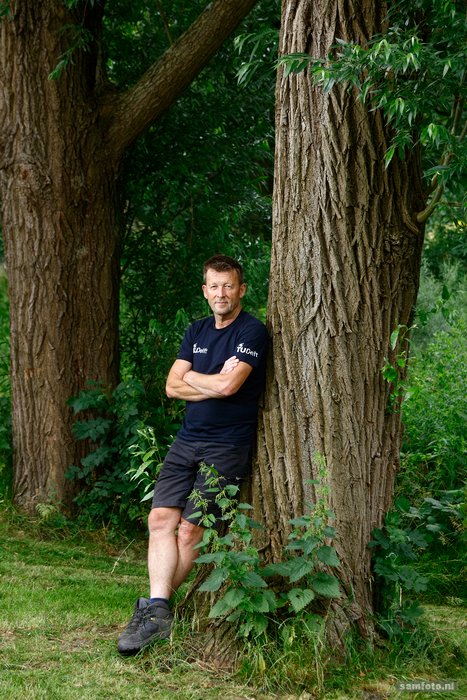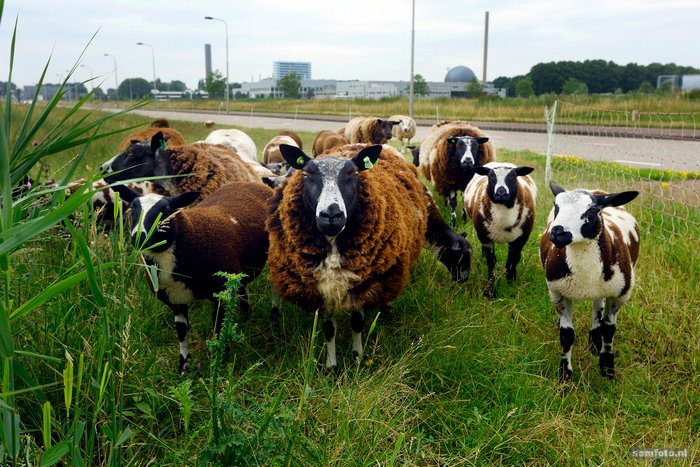Flowers and bees on campus
Nature is playing an increasingly important role on the TU Delft university campus. Delft Outlook joined Rene Hoonhout, Green team leader in the Campus and Real Estate department, on a cycle tour of the campus.
Rene Hoonhout points out a grassy meadow next to the TU Library, with plumes of grass almost a metre high and golden yellow wildflowers in abundance. It's one of the dozens of sites where Hoonhout's team mows as little as possible. A deliberate choice, he explains. “A neatly manicured lawn does nothing for biodiversity, so wherever possible we allow the grass and flowers to run wild. That's good for the insects and the spread of flowers and herbs.” This form of ground management is becoming increasingly popular in the Netherlands. “It's a return to the meadow management of the past,” says Hoonhout, “when the hay meadows were full of flowers and herbs.”
Now he only mows those areas where it is really necessary. In Mekelpark for example, where students and staff want to be able to sit on the grass. And along the tram route on campus, where pedestrians need to be able to see from a distance that they are crossing the tram tracks.
Decorative value versus insects
Around ten years ago Hoonhout started gradually increasing the biodiversity on the 161 hectares of the TU Delft campus, not just by allowing the grassy meadows to run wild, but also choosing natural vegetation along the canals that cross the TU Delft site, and tree species that promote biodiversity. “We used to select trees for their decorative value, but now we look far more at their natural value,” he explains, standing at the edge of a flowering meadow alongside Applied Sciences South. “A plane tree, for example, attracts ten to twenty types of insect, whereas an oak can be home to as many as eighty types of insect.” Across the meadow a group of lime (linden) saplings sway gently in the wind. They were planted a couple of years ago. “Limes are excellent trees for bees.”
Hoonhout has been working as landscape manager at TU Delft for the last 31 years, a task he really enjoys. “Otherwise I wouldn't have stuck it out for so long.” During this time much has changed on campus, like the paved car parks at faculties such as Applied Sciences and EEMCS giving way to the green Mekelpark. How people at TU Delft feel about ‘green’ has also changed, particularly in the last couple of years. “Not so long ago, they were still asking: ‘Why don't you mow that grass there? It looks so messy.’ And now they think it's a shame if I do mow the grass. ‘It's bad for nature,’ they say.”
Helping hand from nature itself
Hoonhout loves being outdoors every day and cycling across the campus. His favourite spot? A tiny hidden park near the P-Sports car park. It was once a garden designed by landscape gardener Mien Ruys, but now it has been overtaken by reeds. In the middle is a path of large boulders. Hoonhout jumps from boulder to boulder. They are hidden from sight by all the trees and nettles surrounding the park. “No-one comes here, so you can really leave nature to its own devices.”
Where possible he gets a helping hand from nature itself. For example, the grass on two undeveloped areas of TU Delft land is grazed by flocks of sheep. And he uses waterside plants as one way to maintain the water quality in the canals on campus. “Without this sort of measure the oxygen levels deteriorate rapidly, particularly in the hot summer weather, leading to fish kill.”
Invasive alien species
The efforts of Hoonhout and his team have borne fruit. He steps forward and picks a fluffy purple-pink flower. “This is hare's foot clover, a plant that started growing here spontaneously.”
But not all spontaneous arrivals are welcome, he explains as a group of Egyptian geese swims by – an invasive alien species. “They lay three or four clutches of eggs a year and are very aggressive. A while back they robbed a falcons’ nest and they displace native goose and duck species.” Our campus tour ends at a field of giant hogweed, another alien species Hoonhout would rather not see on campus. “We mow them once a year.” In one year's time the plants have grown around three metres. “Sheep love hogweed. If they could only graze there…”

